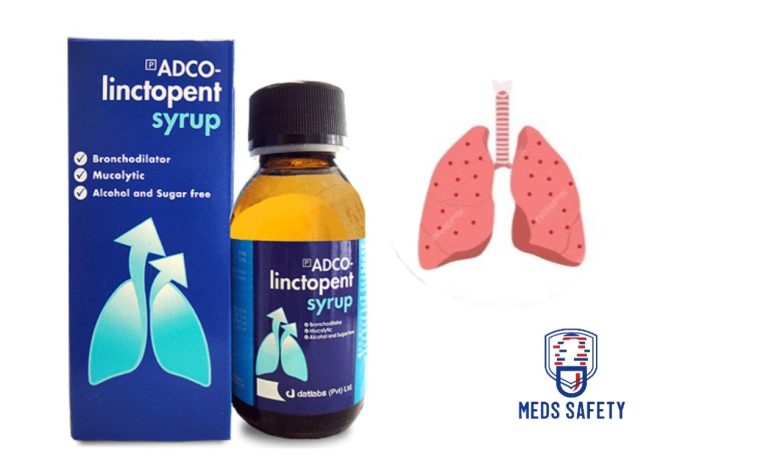Linctopent Syrup: Uses, Benefits, Dosage, Side Effects, Interactions

What is Adco Linctopent Syrup used for?
Adco-Linctopent Syrup is a brand of cough medication formulated to target and provide relief for coughs associated with wheeziness (broncho-spasms) and the presence of thick phlegm. This makes it an excellent choice for individuals dealing with respiratory discomfort caused by these specific symptoms.
Adco-Linctopent Syrup contains two primary active ingredients:
1. Bromhexine Hydrochloride: This compound is known for its mucolytic properties, which help to thin and loosen mucus in the airways. This is particularly important when dealing with tenacious, thick phlegm, as it eases the process of clearing the air passages and provides relief from coughing.
2. Ocriprenaline Sulphate: Ocriprenaline is a bronchodilator, which means it helps to relax the muscles in the airways. This is especially beneficial for individuals experiencing broncho-spasms or wheeziness, as it eases breathing and reduces the discomfort associated with these symptoms.
The synergistic effects of combining these two active ingredients makes Adco-Linctopent Syrup a unique medication for fighting the root causes of coughs associated with wheeziness and thick phlegm, providing fast and effective relief.
Adco-Linctopent Syrup is available in a convenient 100ml & 200ml pack size, making it easy to keep on hand when needed. The syrup form is particularly advantageous for those who find it difficult to swallow pills or capsules, including children and the elderly.
Each 5ml of Adco-Linctopent Syrup contains 4mg of Bromhexine Hcl and 5mg of Orciprenaline So4 as active ingredients. The syrup is also free from sugar, alcohol, and anti-histamines, making it suitable for various dietary preferences.
Dosage Recommendations
The recommended dosages for Adco-Linctopent® Syrup are clear and easy to follow:
1. For adults and children over 12 years, the suggested dose is 10 to 20ml, three times daily.
2. Children between 3 and 12 years old should take 5 to 10ml, three times daily.
3. Infants can be given 2.5ml of the syrup, three times daily.
It’s essential to follow these recommended doses carefully and not to exceed them. Adhering to the prescribed amounts ensures that you receive the desired relief without potential adverse effects.
Pregnancy and Breastfeeding
When it comes to the use of this syrup during pregnancy and breastfeeding, it is essential to consider the potential effects and consult with a healthcare professional for personalized guidance.
Pregnancy
During pregnancy, many women are cautious about using medications to ensure the safety of both the developing fetus and themselves. Adco-Linctopent Syrup contains two active ingredients, bromhexine hydrochloride and ocriprenaline sulfate. It’s crucial to discuss the use of this syrup with a healthcare provider during pregnancy.
• Bromhexine hydrochloride: Bromhexine is generally considered safe for use during pregnancy when the potential benefits outweigh the risks. It is used to relieve respiratory symptoms associated with mucus and phlegm. However, as with any medication, the decision to use it should be made under the supervision of a healthcare professional.
• Ocriprenaline sulfate: Ocriprenaline, a bronchodilator, may have some systemic absorption when used in syrup form. While this absorption is typically low, it’s still important to discuss its use during pregnancy with a healthcare provider to assess potential risks and benefits.
In summary, if you are pregnant and experiencing respiratory symptoms that require the use of Adco-Linctopent Syrup, consult with your healthcare provider. They can evaluate your specific situation and provide guidance on whether the benefits of using this medication outweigh any potential risks.
Breastfeeding
For breastfeeding mothers, it’s important to consider whether the components of Adco-Linctopent Syrup can be transferred to the infant through breast milk. While data on the excretion of these substances in breast milk is limited, the following points should be taken into account:
• Bromhexine and ocriprenaline are generally considered to have low levels of transfer into breast milk. However, the exact amounts may vary from person to person.
• The potential effects of these substances on the nursing infant are not well-documented, and there may be minimal risk associated with their use during breastfeeding.
To make an informed decision about using Adco-Linctopent Syrup while breastfeeding, it’s advisable to consult with a healthcare professional. They can provide individualized guidance and assess whether the benefits of using the syrup to alleviate your cough symptoms outweigh any potential risks to your nursing baby.
In both pregnancy and breastfeeding situations, open communication with a healthcare provider is crucial to ensure the safety and well-being of both the mother and the baby. They can help you weigh the potential risks and benefits and make an informed choice regarding the use of Adco-Linctopent Syrup.
Side Effects
Adco-Linctopent Syrup is generally well-tolerated when used as directed, but like all medications, it can potentially cause side effects. It’s essential to be aware of possible side effects, even though not everyone will experience them. If you experience any side effects, especially if they are severe or persistent, it’s important to contact your healthcare provider. Here are some common side effects associated with Adco-Linctopent Syrup:
1. Gastrointestinal Disturbances:
• Nausea
• Vomiting
• Upset stomach
• Diarrhea
2. Dizziness:
• Some individuals may experience dizziness or lightheadedness after taking the syrup. This can affect your ability to perform activities that require mental alertness, such as driving. Avoid operating heavy machinery or driving if you feel dizzy.
3. Headache:
• Headaches are a possible side effect. If you experience a severe or persistent headache, consult your healthcare provider.
4. Allergic Reactions:
• While rare, some people may experience allergic reactions to the ingredients in Adco-Linctopent® Syrup. If you notice symptoms such as skin rash, itching, swelling of the face, lips, or tongue, or difficulty breathing, seek immediate medical attention.
5. Fast Heartbeat (Tachycardia):
• Ocriprenaline sulfate, one of the active ingredients in the syrup, can cause an increase in heart rate in some individuals. If you notice a significantly increased heart rate or palpitations, contact your healthcare provider.
6. Restlessness or Nervousness:
• Ocriprenaline may lead to restlessness, nervousness, or anxiety in some people. If these feelings become bothersome, consult your healthcare provider.
7. Insomnia:
• Difficulty falling asleep or staying asleep (insomnia) may occur in some individuals. Avoid taking the syrup close to bedtime if you experience this side effect.
8. Muscle Tremors:
• Muscle tremors or shakiness may occasionally be observed. If these symptoms persist or worsen, consult your healthcare provider.
It’s important to remember that not everyone will experience these side effects, and many people tolerate Adco-Linctopent Syrup without any adverse reactions. If you have concerns about the side effects or experience any unusual symptoms while using the syrup, contact your healthcare provider. They can provide guidance on managing side effects or may recommend alternative treatments if necessary. It’s also crucial to follow the prescribed dosage and not exceed the recommended amount, as exceeding the dose may increase the risk of side effects.
Drug Interactions
Drug interactions can occur when a medication interacts with another drug, food, or substance in a way that affects its effectiveness or safety. It’s important to be aware of potential drug interactions when using Adco-Linctopent Syrup to ensure that it is safe and effective. Here are some common drug interactions to be mindful of:
1. Beta-Blockers: Adco-Linctopent Syrup contains ocriprenaline sulfate, which is a bronchodilator. When used concomitantly with beta-blockers (e.g., propranolol), it can potentially reduce the effectiveness of both medications. It is advisable to consult with a healthcare provider when these drugs are prescribed together.
2. Antihypertensive Medications: Ocriprenaline sulfate in Adco-Linctopent Syrup may have blood pressure-lowering effects. Combining it with antihypertensive medications can lead to additive effects, potentially causing a significant drop in blood pressure. Close monitoring and dose adjustments may be necessary if used together.
3. Medications for Diabetes: Ocriprenaline may affect blood sugar levels. When used with diabetes medications, it can interfere with blood sugar control. Dose adjustments or more frequent monitoring may be required when using both medications concurrently.
4. Monoamine Oxidase Inhibitors (MAOIs): MAOIs are a type of antidepressant that can interact with a variety of medications, including bronchodilators like ocriprenaline. Combining these drugs can lead to increased side effects and may be unsafe. Consult with a healthcare provider before using Adco-Linctopent Syrup if you are taking MAOIs.
5. Other Cough and Cold Medications: Combining Adco-Linctopent Syrup with other cough and cold medications may result in an increased risk of side effects, such as dizziness, drowsiness, or an elevated heart rate. Avoid using multiple cough medications simultaneously unless directed by a healthcare provider.
6. CYP1A2 Substrates: Ocriprenaline sulfate in Adco-Linctopent Syrup may interact with medications metabolized by the CYP1A2 enzyme. This can affect the blood levels of those drugs. Common examples of CYP1A2 substrates include theophylline and certain psychiatric medications. Consult your healthcare provider if you are taking such medications.
It is crucial to inform your healthcare provider about all the medications, supplements, and over-the-counter drugs you are taking, including Adco-Linctopent Syrup. They can help you manage potential drug interactions by adjusting doses, timing of administration, or choosing alternative treatments when necessary. Your healthcare provider will consider the specific drugs you are using and your medical history to ensure your safety and the effectiveness of your treatment.





